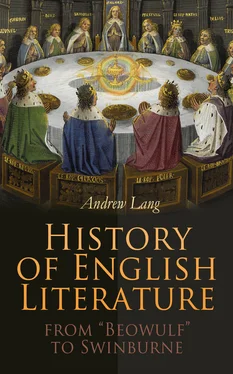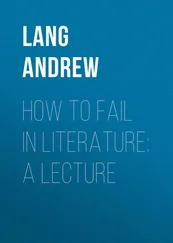Many recent critics of Tennyson's "Idylls of the King," which is mainly derived from Malory, appear to think that Malory's "Morte d'Arthur" is a violent, brutal, licentious book, and that Tennyson invented the noble courtesy, chivalry, humanity to suit the middle-class morality of 1860. This opinion is merely stupid. "The Morte," it has been well said, "assumes the recognition of a loftier standard of justice, purity and unselfishness than its own century knew.... The motive forces are the elemental passions of love and bravery, never greed, or lust, or cruelty,"—except of course in traitors like Meliagraunce and Mordred. The knights have the strongest sense of fair play: Sir Lancelot bears no spite against Sir Palamedes, a pagan knight, who, from ignorance of the rules, deals a stroke in a tournament which the rules forbade. Their sense of honour is crystal-clear, and, as in Tennyson's Idylls, this honour and loyalty make the tragedy; the struggle between Lancelot's love of Guinevere, and his friendship for and loyalty to King Arthur. His sin brings its own punishment, he cannot win the vision of the Grail, that Holy thing: "blessed are the pure in heart for they shall see God".
Arthur himself, after the wars of his youth, is but faintly drawn: it is not for the King to seek adventures, but to hear the suits of his people who come to him for help and justice. A mystery of Fate hangs over him: he is smitten by the sins of his knights, and passes away, sorely wounded but alive, as strangely as Œdipus in the tragedy of Sophocles: perhaps, who knows, to come again. "In Avalon he groweth old," in the peaceful hidden land of apples and apple-blossom.
The scenes all pass in a world where colours are magically soft and bright. There is an old song of the fourteenth century which gives the kind of colour that abounds in Malory.
Lully, lulley, lully, lulley The fawcon hath borne my mate away! He bare him up, he bare him down, He bare him into an orchard brown. In that orchard there was a hall That was hanged with purple and pall. And in that hall there was a bed, It was hung with gold so red. And in that bed there lieth a knight, His wounds bleeding day and night. By that bedside kneeleth a may, And she weepeth both night and day.
This is like a song made on some scene in the Quest for the Grail.
Malory's world is "an unsubstantial fairy place," yet there is no fairy non-morality. There is the loftiest ideal among the knights who follow the gleam and fragrance of the Holy Grail. That all do not attain to their ideal is but the failing of human nature, the ideal is among them, they aspire to reach "the spiritual City". For Guinevere, Malory has the chivalrous compassion of Homer for Helen; of Chaucer for Criseyde, but while Helen wins, with light penance, to her home by the Eurotas, and her translation to Elysium, the Avalon of Greece, it is through many years of penance that Guinevere comes to her rest. What Shelley said of the end of the Iliad may be said of the last chapters of the "Morte," they die away "in the high and solemn close of the whole bloody tale in tenderness and inexpiable sorrow".
The prose with all its simplicity has rhythm and charm. Thus, "Therefore all ye that be lovers call unto your remembrance the month of May, like as did Queen Guinevere, for whom I make here a little mention, that while she lived she was a true lover, and therefore had she a good end". The words spoken by Sir Ector over the dead body of Lancelot are one of the noblest passages in English prose.
The very titles of the chapters call us into the realm of romance, like a blast blown on Arthur's horn. "How Sir Lancelot came into the Chapel Perilous, and gat there of a dead corpse a piece of cloth and a sword." "How the damsel and Beaumains came to the siege, and came to a sycamore tree, and there Beaumains blew an horn, and then the Knight of the Red Lands came to fight him." "How Sir Lancelot, half-sleeping and half-waking, saw a sick man borne in a litter, and how he was healed with the Sangreal." Who can read the titles, and not make haste to read the chapters? The beautiful close of Tennyson's "Morte d'Arthur" is merely done into verse from the fifth chapter of Malory's twenty-first book,—the casting of Excalibur into the mere, and the coming of the barge with the elfin ladies, "many fair ladies, and among them all was a Queen, and all they had black hoods, and all they wept and shrieked when they saw King Arthur".
But for Malory, the old Arthurian romances would be known only to a few of the learned. Malory "made them common coin," his romance was neglected only in the eighteenth century. It has been the inspiration of many poets, but none can "recapture the first fine careless rapture," to which Tennyson comes nearest in the best of his "Idylls of the King," and in "Sir Galahad," and "The Lady of Shalott".
Next to Chaucer's poems, Malory's romance is the greatest thing in English literature from "Beowulf" to Spenser. To boys, and to men who retain the boy, the "Morte" is an inestimable treasure, which has not to be sought for in the seldom-visited shelves that hold the publications of learned Societies, but is within the reach of all. 1
1.In the Globe edition, edited by Sir Edward Strachey. Macmillan & Co.
CHAPTER XIV.
EARLY SCOTTISH LITERATURE.
Table of Contents
For purposes of convenience the development of "Ynglis" literature north of the Tweed and Esk, may be treated in this place.
Originally the "Scots" or Scottish tongue was Gaelic, the language of the Irish Scots who, landing in Argyll about a.d. 500, finally gave a dynasty and its existing name, to "Scot" land. When the dynasty acquired the Anglicized Lothian and much of Cumberland, it adopted the English speech, consequently the writers of the thirteenth and fourteenth centuries in Scotland used a form of northern English or "Ynglis," and knew not Gaelic. They called their speech "English" till the long wars with England led them to draw a distinction and patriotically style it "Scots" or "Scottis". Thus by 1562, Ninian Winzett upbraids John Knox for "knapping English" in his writings, and forgetting the "Scots" that he learned at his mother's knee. Gaelic was no longer reckoned "Scots," it was Ersch, Yrisch, or Erse. Even before the days of Edward I, the town seal of Stirling, on the Forth, describes the Gaelic-speaking men north of Forth as Scoti bruti. The Scottish writers did not know, and therefore despised Gaelic, from which they have scarcely borrowed anything. Latin and French they knew, and enriched their tongue by borrowing from these sources.
The one verse of Scottish poetry that may have survived from the end of the thirteenth century, the lines on the death of Alexander III, are charming, but, if they were written at the time, or shortly after, they must have been modernized, more or less, when Wyntoun, the rhyming chronicler, quoted them about 1420, twenty years after the death of Chaucer.
Setting aside the enigmatic Huchown already discussed, John Barbour, author of "The Brus," a history of King Robert Bruce in rhyming octosyllabic couplets, is the first poet of English speaking Scotland. He remains one of the most spirited and readable; the most like Sir Walter Scott, who used his book in poetry and in prose historical writing.
By 1357 Barbour was Archdeacon of Aberdeen: he was probably born at least ten years before Chaucer. In 1357 he went, with others, to study at Oxford, probably at the Scottish college, Balliol. He also visited France, for studious purposes; he held a position in the Exchequer, and, after finishing "The Brus" in 1376, received a pension from Bruce's grandson, Robert II: other pensions he received: he died in 1396. He had written other works, lost or disputable, and a romantic genealogy of the Stuarts, who were really Fitz Alans, and of ancient Breton origin, not, as was fabled, of the old Scoto-Irish dynasty. "A Buik of Alexander" (the romance of Alexander the Great), is attributed to Barbour with much probability.
Читать дальше












